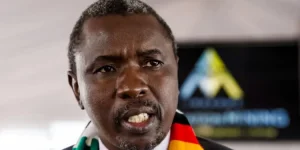The US Treasury Office placed sanctions on Kudakwashe Regimond Tagwirei because he helped Zimbabwe government leaders. They also sanctioned his business, Sakunda Holdings. This happened exactly two years after Zimbabwe's government violently stopped citizens who protested flawed elections. At least six people died during those protests on August 1, 2018.
Treasury Deputy Secretary Justin G. Muzinich said Tagwirei and other rich Zimbabweans hurt their country's growth and harmed regular citizens through corruption. He added that America supports the financial well-being of Zimbabwe's people and will target corrupt acts by politicians and their money-backers.
Tagwirei runs businesses with close ties to Zimbabwe's ruling party and high-ranking officials, including President Emmerson Mnangagwa and First Vice President Constantino Chiwenga. Both men already face US sanctions from 2003 and 2005. Tagwirei used his connections with powerful officials to win government contracts and gain access to US dollars.
He gave expensive gifts like luxury cars to top government officials. His business grew dramatically after former President Robert Mugabe left office in 2017. Tagwirei made millions through unclear business deals and his relationship with President Mnangagwa.
As CEO of Sakunda Holdings, Tagwirei controls company strategy and maintains relationships with government regulators. Government audits sparked a 2019 investigation into missing public funds. Officials couldn't explain what happened to about $3 billion given through the Command Agriculture program—a farm subsidy program that President Mnangagwa supported and Sakunda Holdings mostly funded.
The Treasury Department sanctioned Tagwirei for helping Zimbabwe's government and officials already under sanctions. They sanctioned Sakunda Holdings because Tagwirei controls it. At the same time, they removed sanctions on the recently deceased John Bredenkamp and 20 companies he controlled.
US sanctions against Zimbabwe began in March 2003 with Executive Order 13288. The Treasury Department uses these powers to identify and disrupt people who abuse human rights, engage in corruption, or harm democratic processes in Zimbabwe. The State Department urges Zimbabwe's government to create a peaceful and prosperous country.
Instead of blaming others, American officials want Zimbabwe's leaders to address corruption among elite officials who misuse public resources. These sanctions show America's commitment to supporting a transparent Zimbabwe. Anyone with questions can visit the Treasury's website about Zimbabwe sanctions.
Treasury Deputy Secretary Justin G. Muzinich said Tagwirei and other rich Zimbabweans hurt their country's growth and harmed regular citizens through corruption. He added that America supports the financial well-being of Zimbabwe's people and will target corrupt acts by politicians and their money-backers.
Tagwirei runs businesses with close ties to Zimbabwe's ruling party and high-ranking officials, including President Emmerson Mnangagwa and First Vice President Constantino Chiwenga. Both men already face US sanctions from 2003 and 2005. Tagwirei used his connections with powerful officials to win government contracts and gain access to US dollars.
He gave expensive gifts like luxury cars to top government officials. His business grew dramatically after former President Robert Mugabe left office in 2017. Tagwirei made millions through unclear business deals and his relationship with President Mnangagwa.
As CEO of Sakunda Holdings, Tagwirei controls company strategy and maintains relationships with government regulators. Government audits sparked a 2019 investigation into missing public funds. Officials couldn't explain what happened to about $3 billion given through the Command Agriculture program—a farm subsidy program that President Mnangagwa supported and Sakunda Holdings mostly funded.
The Treasury Department sanctioned Tagwirei for helping Zimbabwe's government and officials already under sanctions. They sanctioned Sakunda Holdings because Tagwirei controls it. At the same time, they removed sanctions on the recently deceased John Bredenkamp and 20 companies he controlled.
US sanctions against Zimbabwe began in March 2003 with Executive Order 13288. The Treasury Department uses these powers to identify and disrupt people who abuse human rights, engage in corruption, or harm democratic processes in Zimbabwe. The State Department urges Zimbabwe's government to create a peaceful and prosperous country.
Instead of blaming others, American officials want Zimbabwe's leaders to address corruption among elite officials who misuse public resources. These sanctions show America's commitment to supporting a transparent Zimbabwe. Anyone with questions can visit the Treasury's website about Zimbabwe sanctions.












